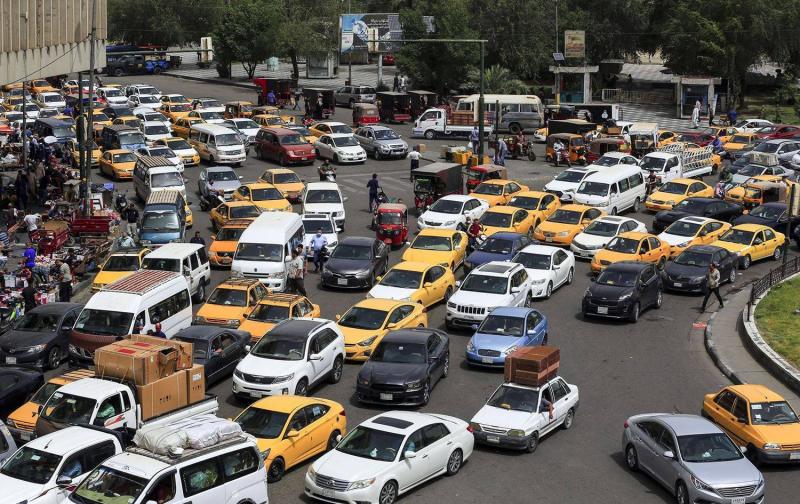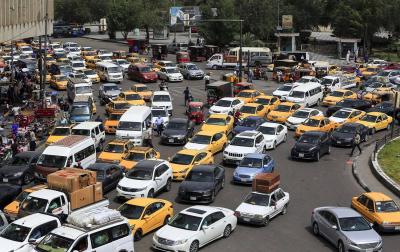In a sudden decision, the Iraqi Council of Ministers has decided to raise fuel prices by nearly 30% for enhanced gasoline and by 25% for super gasoline. This move is part of a broader government plan aimed at reducing traffic congestion, but it has provoked anger and discontent among drivers in particular and citizens in general, due to its potential economic repercussions that may lead to higher prices across the country.
Taxi driver Ali Mohammed from Baghdad stated, "Taxi owners are suffering from high taxes and nearly daily traffic fines, compounded by deteriorating roads that damage vehicles." He emphasized that "the decision to raise gasoline prices by 200 dinars at once is the last straw; it will greatly exacerbate the struggle for a livelihood."
During its recent regular session chaired by Prime Minister Mohammed Shia al-Sudani, the Council voted to increase the price of enhanced gasoline (high-octane) from 650 dinars per liter to 850 dinars per liter, and super gasoline from 1000 dinars to 1250 dinars per liter, effective from May 1.
This decision follows a measure taken by Mustafa al-Kadhimi's government in 2020 to reduce the price of high-octane gasoline to 650 dinars from 850 dinars per liter.
### Cab Drivers Most Affected
Mohammed added that "taxi drivers will be greatly affected by this decision, as gasoline costs will be exorbitant for them, further burdening employees whose salaries have not been increased to cover this new price hike." Employee Hussein Sajad from Karbala commented, "The high cost of gasoline will negatively impact citizens in general and employees in particular, as this price increase is an additional expense on their fixed salaries amidst rising living costs."
Some observers downplay the impact of the enhanced gasoline price hike on overall transportation costs, noting that the prices of "regular" gasoline remain unchanged, according to a government source.
In response to these justifications, driver Ammar Qassem stated that the vast majority of citizens resort to using enhanced gasoline due to the poor quality of regular gasoline, which leads to vehicle malfunctions and expensive repairs, especially since most vehicles are not suited to this "inferior" fuel.
### Sudden Decision After Import Halved
On March 20, the Oil Products Distribution Company confirmed that gasoline imports had been halved following the commissioning of the Karbala refinery. The Minister of Oil’s plan to cease gasoline imports is proceeding according to its timeline.
Company Director General Hussein Talib stated that "the Ministry of Oil has put a plan in place within a timeframe to end the importation of petroleum products, especially gasoline," noting that "after the commissioning of the Karbala refinery, gasoline imports dropped to 7 million liters from 14 million liters." He continued that "after the Northern Refinery is operational, gasoline imports will further decrease to 4 million liters," clarifying that "increasing the production capacity of national refineries will offset remaining gasoline imports."
Talib highlighted that "Iraq has concluded the importation of other products such as gas and kerosene after local production reached self-sufficiency."
### "Incorrect" Decision
Commenting on the gasoline price hike, economic expert Abdulrahman al-Sheikhly stated, "Iraq is an oil-producing country that relies on oil reserves and exports. There are oil purification stations producing petroleum products that have become operational, and previously halted refineries have resumed work, which should have reduced gasoline prices to alleviate the burdens on citizens, not the opposite."
He added that "the government should not compare gasoline prices in neighboring countries or European nations, as Iraq has its own unique circumstances." He reminded the government of the major protests that erupted in the 1960s due to a mere 10 fils raise in gasoline prices, which paralyzed Iraq.
He affirmed that "issuing this decision from a higher authority that does not understand the people's conditions is not correct, and this decision should have been discussed within Parliament, where representatives of the people can truly feel the impact."
He warned that "the decision will have economic ramifications, including rising prices for food and services under the pretext of increased transportation costs, as well as taxi fares, which will ultimately reduce citizens' purchasing power. Therefore, the decision should be reconsidered within the one-month period granted for its implementation on May 1."
### Additional Expert Comments
Economic expert Durgham Mohammed Ali stated that "the Iraqi market is very sensitive, and the inflation rate is already high due to the dollar and limited local output. Therefore, any increase in prices is currently unjustifiable and will exacerbate market conditions without sufficient rationale."
He mentioned that this decision comes amidst a new state policy aimed at increasing revenue from citizens by various means without a focus on genuine development or increasing the taxpayer base. He added that price increases will pressure citizens and damage the positive relationship between citizens and the government, which is supposed to represent and address their issues.
He expressed hope that decisions like this would be reversed, noting that the timing is poorly thought out and the methods are hasty. He recommended exploring unconventional approaches to support electronic payment culture, enhance genuine development, strengthen the investment climate, and avoid decisions that could deter investment.
### Contrasting Opinions
Economic expert Nabil al-Marsoumi commented that gasoline prices are significantly linked to crude oil prices, noting that the price of enhanced gasoline was around 1000 dinars per liter in 2021, which caused Iraq to incur annual losses exceeding one billion dollars due to subsidizing the price domestically.
### Sulaymaniyah Lowers Gasoline Prices
Notably, spokesperson for Sulaymaniyah fuel stations Bahman Abdulqader announced on March 14 a reduction in gasoline prices across all three types by 25 dinars. Abdulqader stated that "the price of super gasoline will become 1200 dinars, the enhanced gasoline will be priced at 1050 dinars, while regular gasoline will be 825 dinars." He added that "the price reduction is linked to decreased demand and increased supply in the market."
He pointed out that "since the beginning of this year, prices for all types of gasoline have decreased by about 100 dinars."
### Iraq's Position on Gasoline Prices
It is worth noting that Iraq advanced one place in January 2024 on the list of countries with the cheapest gasoline prices, reaching the 13th position. Iran topped the list with the cheapest prices at $0.029 per liter.
According to data from Global Petrol Prices reviewed by Shafaq News Agency, Iraq is ranked 13th with a price of $0.572 per liter, while Qatar ranks 14th at $0.577 per liter, and Oman stands 17th at $0.621 per liter. Colombia is ranked 42nd with a price of $1.052 per liter.




